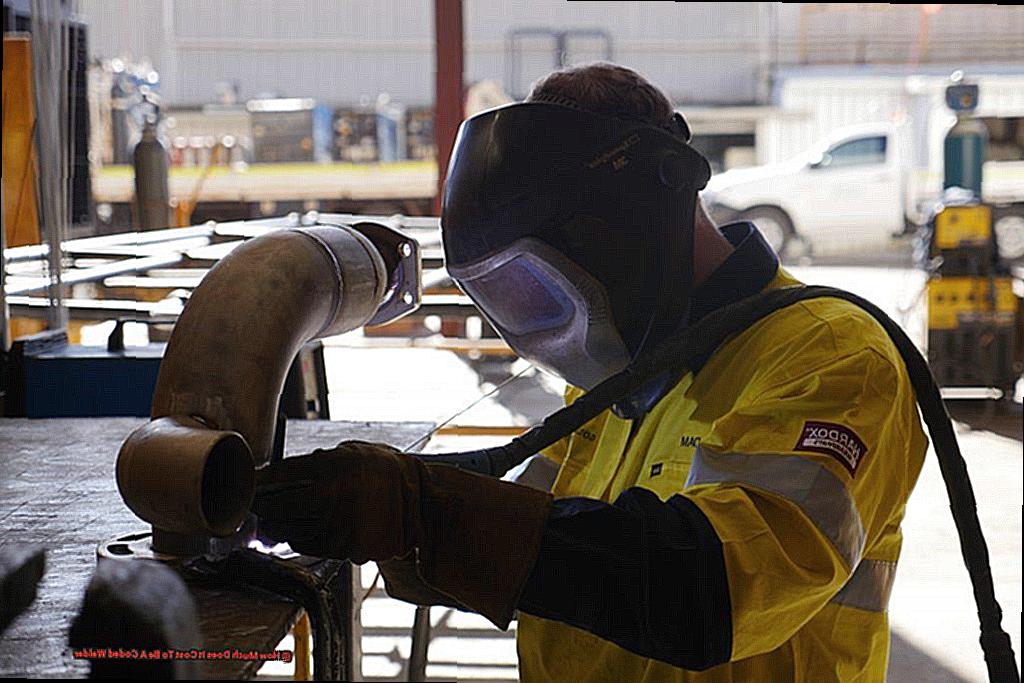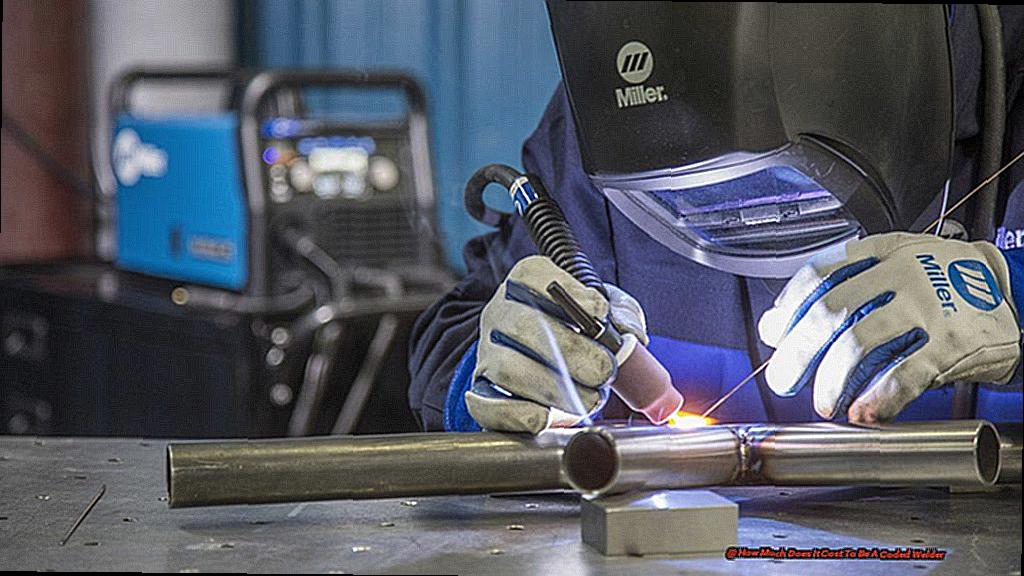Are you intrigued by the idea of becoming a coded welder?
It’s a well-known fact that welding is a highly coveted skill in the industrial realm, and as the demand for skilled tradespeople continues to rise, many are considering this career path. But amidst all the excitement and potential opportunities, one question often arises: what is the cost of becoming a coded welder?
Whether you’re just starting out or seeking to advance your welding skills, join us as we uncover the true cost of becoming a coded welder.
Featured Programs and Schools
Contents
Look no further than the skilled and coded welding field. These experts are responsible for fabricating and fixing a wide range of products using various metals. From automobiles to construction, shipbuilding to manufacturing, there is no shortage of job opportunities for skilled and coded welders.
But how does one become a certified welder? What are the requirements and education options available? Let’s delve into the details of becoming a skilled or coded welder.
Firstly, individuals must be at least 18 years old and possess a high school diploma or equivalent to embark on a career as a coded welder. However, some employers may have additional prerequisites and preferences regarding education and experience.
There are multiple routes one can take to become a certified welder, ranging from certificate programs to associate’s and even bachelor’s degree programs. Depending on the level of education chosen, these programs can last anywhere from 6 months to 4 years. Certain programs may also require fundamental courses in mathematics, science, and technical subjects.
Another option that provides valuable hands-on experience is apprenticeships. While not mandatory, apprenticeships allow aspiring welders to work alongside seasoned professionals while acquiring the necessary skills for the job. This is an excellent way to gain practical knowledge and establish connections within the industry.
In most cases, certification is not required but can be obtained through the American Welding Society (AWS). However, becoming a coded welder necessitates specialized training and certification from an AWS-accredited program. This certification process entails passing specific welding approval tests every two years, ensuring that coded welders remain up-to-date with their abilities and knowledge.
According to the US Bureau of Labor Statistics, the median annual salary for welders is $41,380. The employment growth for this occupation is expected to be 6% between 2016 and 2026, on par with other professions.
Coded Welder Certification
Combine your passion for metalwork with a fulfilling career through “Certified Welder Certification”. This program offers comprehensive training and techniques to elevate your welding skills to mastery.
Aspiring welders have a range of training options from entry-level positions to management roles. These include classroom instruction and hands-on apprenticeships. With a welding certificate, you can start your career in entry-level jobs or apprenticeships. However, if you have your sights set on higher-paying positions, completing a bachelor’s degree in welding can lead to management or engineering roles.
So what will you learn in these courses and degree programs? From the fundamentals of welding to exam preparation for certification, blueprint reading to shop mathematics, mechanical drawing to cutting systems, safety procedures to welding processes, and metal fabrication. As you advance through the levels of education, more advanced topics like drafting techniques and fabrication are taught in associate’s degrees. Bachelor’s degrees delve deeper into metallurgy, engineering, and welding computer programming with an emphasis on leadership and design for higher-level positions.

But what is the cost of this training? Welding programs at community colleges or technical schools can range from $5,000 to $15,000 over two years. However, tuition and duration may vary based on location and specialization. For instance, Modern Welding School in New York charges $6,000 for a three-month program, while Alexandria Technical and Community College in Minnesota costs $7,000 for a one-year program. For those pursuing associate’s or bachelor’s degrees, tuition may differ based on residency status.
What Does a Coded Welder Do?
Duties of a Coded Welder:
A coded welder is a master in the art of joining metal pieces using an array of welding techniques and tools. This job demands precision, keen attention to detail, and strict adherence to safety standards to guarantee the durability and robustness of each weld. As a coded welder, your responsibilities may include cutting, fitting, and welding metal materials according to company guidelines, national codes, and client specifications.
Investing in Becoming a Coded Welder:
To become a coded welder, certain qualifications and experiences are necessary. These may include completing basic or advanced welding courses at an accredited institution, acquiring certification to demonstrate proficiency in specific welding codes and standards, and obtaining hands-on experience through apprenticeships or on-the-job training. Essential skills include meticulousness, manual dexterity, physical strength, and problem-solving abilities.
The work environment for coded welders can vary from fabrication shops to construction sites or industrial facilities. This job may also require physical demands like standing for extended periods, working in confined spaces, or wearing protective gear. The top industries for code welders include manufacturing, construction, and infrastructure sectors. The job opportunities can range from entry-level positions to specialized roles such as pipe welder or structural welder.
Perks of Being a Coded Welder:
Aside from a gratifying career that allows you to work with your hands and create tangible objects, there are numerous benefits to being a coded welder. These may include health insurance coverage, retirement plans, paid time off, or overtime opportunities. The salary for coded welders can vary based on education, certification, experience, location, and company size.
Requirements to Become a Coded Welder
Becoming a coded welder may seem like an intimidating feat, but with determination and proper guidance, it can lead to a prosperous and fulfilling career. As a welding expert, you have the opportunity to become a certified professional who is in high demand in the industry. In this section, we will delve into the prerequisites for becoming a coded welder, including age and educational requirements, training programs, specialized certification, and assessments.
The first and foremost requirement is that you must be at least 18 years old and have a high school diploma or GED. This ensures that you have a strong educational foundation to build your welding skills upon. Once you meet these requirements, you can enroll in an accredited training program by the American Welding Society (AWS). These programs provide hands-on training in various welding techniques, safety protocols, and equipment operation.
In addition to formal training, obtaining specialized certification is crucial for becoming a coded welder. This involves familiarizing yourself with the code by acquiring the Welding Procedure Specification (WPS) for the particular type of welding you wish to specialize in. The WPS outlines the parameters for the welding process, such as materials, electrodes, preheat temperatures, and more. It allows you to practice and refine your skills in that specific type of welding.
Lastly, passing a test exclusively for the welding code you wish to be certified in is imperative. This test usually comprises written and hands-on sections to assess your knowledge and skills. Upon successful completion of the test, you will receive your coding certification, validating your expertise in that specific welding process.
In conclusion, becoming a coded welder demands determination and perseverance. However, with appropriate qualifications and certifications, you can unlock doors to exciting career opportunities in multiple industries such as construction, manufacturing, oil and gas, and more. So why wait?
Steps to Become a Coded Welder
I have compiled a comprehensive guide on how to become a certified or coded welder. Widely recognized as an invaluable skill in industries such as construction and oil and gas, welding offers lucrative career opportunities for individuals with the right qualifications and experience.
So, what are the necessary steps to becoming a certified or coded welder? Let’s break it down.
Step 1: Acquire Skills and Experience
The first essential step towards becoming a certified welder is gaining the necessary skills and experience. This can be achieved through formal education at a vocational school or community college or through hands-on training. It is crucial to learn various welding techniques and safety protocols to become a proficient and efficient welder.
Step 2: Choose the Type of Certification
There are several types of welding certifications available, each with its own requirements and benefits. These include certifications from esteemed organizations such as the American Welding Society (AWS), American Petroleum Institute (API), or American Society of Mechanical Engineers (ASME). Conduct thorough research and select the certification that aligns best with your career aspirations.
Step 3: Select an Accredited Organization
Once you have decided on the type of certification, the next step is to choose a reputable organization that offers it. Keep in mind that each organization may have its own specific requirements, so be sure to carefully review their guidelines before proceeding.
Step 4: Successfully Pass a Performance-Based Test
To become a certified welder, you will need to pass a performance-based test that assesses your knowledge and skills in various welding procedures. This test may involve visual examinations, destructive testing, or non-destructive testing.
Step 5: Consider Pursuing Multiple Certifications
To broaden your job prospects, consider obtaining multiple certifications. Each certification will showcase your proficiency in different welding processes, making you an adaptable and valuable candidate for potential employers.
Coded Welder Salary Info
Are you intrigued by the idea of becoming a certified welder? Do you wonder about the earning potential in this field? Well, you have landed on the right page. In this blog post, we will delve into the realm of coded welders and their salaries in both the UK and the US. So, let’s dive right in.
What Exactly is a Coded Welder?
Before we jump into the details, let us first understand what exactly a coded welder is. A coded welder is someone who has received certification from an accredited organization for performing specific types of welding. These certifications are often mandatory for industries like construction, oil and gas, and manufacturing to ensure that the welders possess the necessary skills and knowledge to carry out their tasks safely and efficiently.
Average Salary for Coded Welders in the UK
According to research, the average annual salary for a coded welder in the UK is £37,000. However, this figure can vary depending on various factors such as experience, location, and industry. For instance, a novice coded welder may earn around £20,000 per year, whereas an experienced one can rake in up to £50,000. The location can also significantly impact salary differences, with coded welders in London earning higher pay compared to their counterparts in other parts of the UK.
Industries such as oil and gas and construction tend to offer higher salaries for coded welders due to the rigorous nature of their work. On the contrary, industries like manufacturing may offer lower pay but more stable job opportunities.
Average Salary for Certified Welders in the US
In the United States, certified welders earn an average hourly wage of $19, which translates to an annual salary of approximately $42,000. Again, factors such as experience, location, and industry play a crucial role in determining salary discrepancies.
Coded Welder Career Outlook and Job Growth
As a certified welder, you have the potential to earn a median yearly salary of $44,190, with top earners bringing in over $65,000 per annum. But what elements contribute to this lucrative income? Let’s delve into the intricacies.
Experience and accreditations play a critical role in determining a welder’s pay grade. While entry-level welders may begin with modest salaries, as they amass experience and acquire certifications, their earning capabilities significantly increase. Additionally, specializing in specific industries or techniques such as underwater welding or aerospace can lead to even more substantial incomes.
But it’s not just about the monetary benefits. Welding plays a pivotal role in various sectors, including construction, manufacturing, automotive, aerospace, and energy. This means that welders are highly sought after and have job security. In fact, the job outlook for welders is projected to grow by 3% from 2020 to 2030.
However, the demand for welders may vary depending on the field. For instance, renewable energy and infrastructure development show potential for significant expansion in the future. Geographic location can also impact job availability and income potential for welders.
To maximize your earning potential as a welder, investing in training and continuously honing your skills is crucial. With industries constantly evolving and new technologies emerging, staying up-to-date with current trends can open up new opportunities and enhance your value as a welder.
In conclusion, a coded welder career offers stability, high earning potential, and avenues for growth. With the right blend of experience, certifications, and industry expertise, you can unleash the untapped potential of this often overlooked trade.
Conclusion
In conclusion, the world of coded welding presents a fulfilling and promising career path for those who enjoy working with their hands and creating tangible objects. While the initial investment may seem daunting, the potential for financial stability and growth is significant. With various education options available, such as certificate programs and apprenticeships, individuals can choose a path that aligns with their goals and aspirations.
Becoming a certified or coded welder requires determination, hard work, and a thirst for continuous learning. However, the rewards are plentiful – from job security to lucrative salaries and opportunities for advancement in diverse industries. As the demand for skilled tradespeople continues to rise, now is an opportune time to consider a career as a coded welder.
So if you’re intrigued by the idea of becoming a coded welder, don’t hesitate to take the necessary steps towards achieving your goal. With dedication and passion, you can unlock doors to exciting opportunities and unleash your full potential in this highly sought-after trade.





